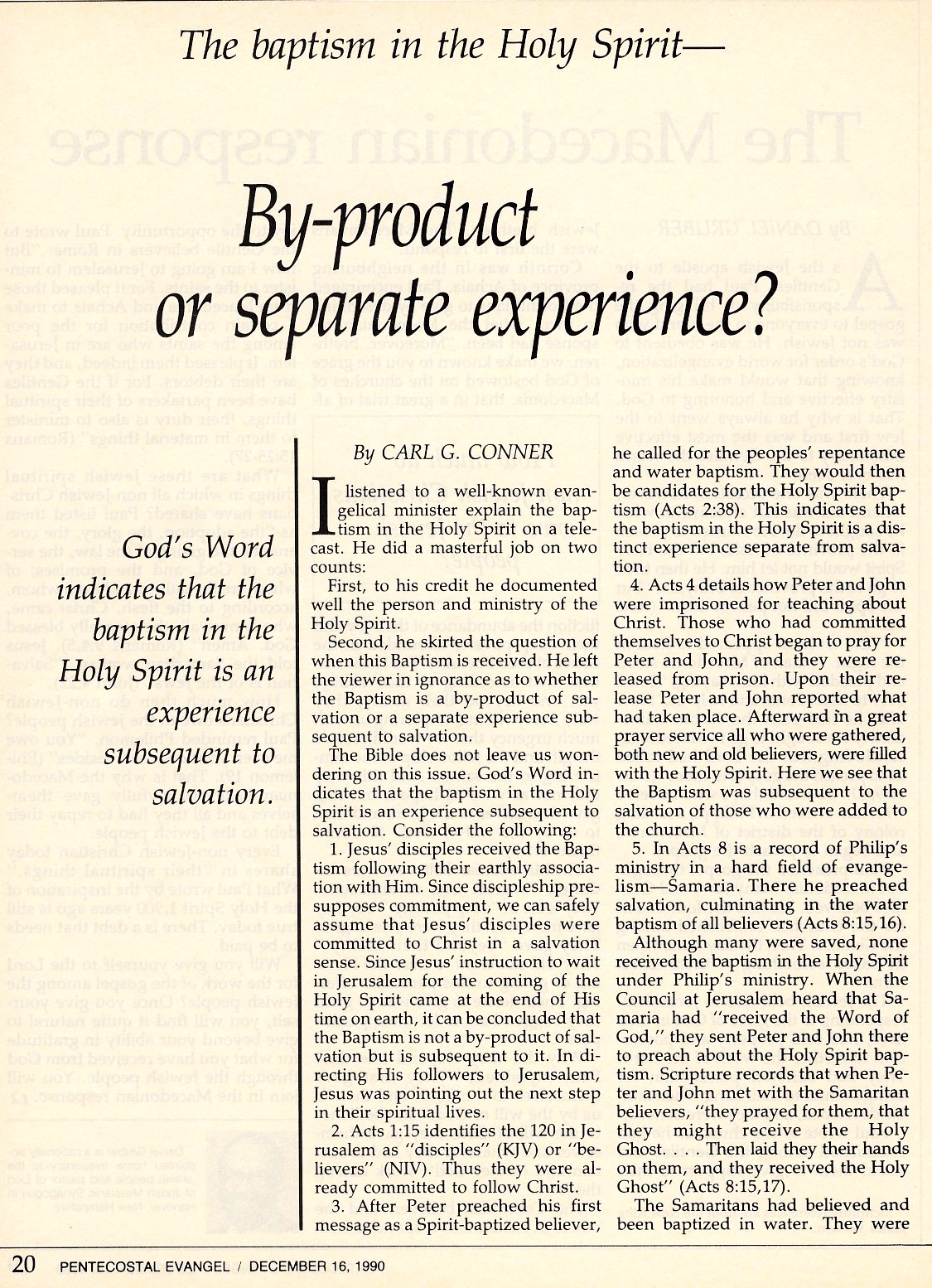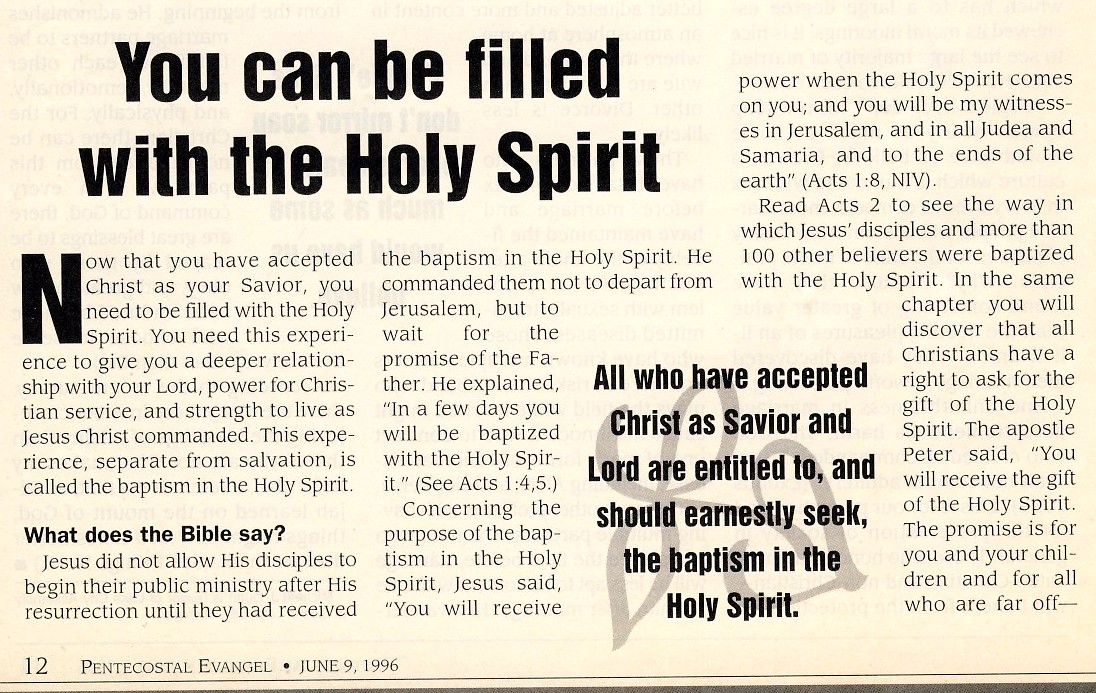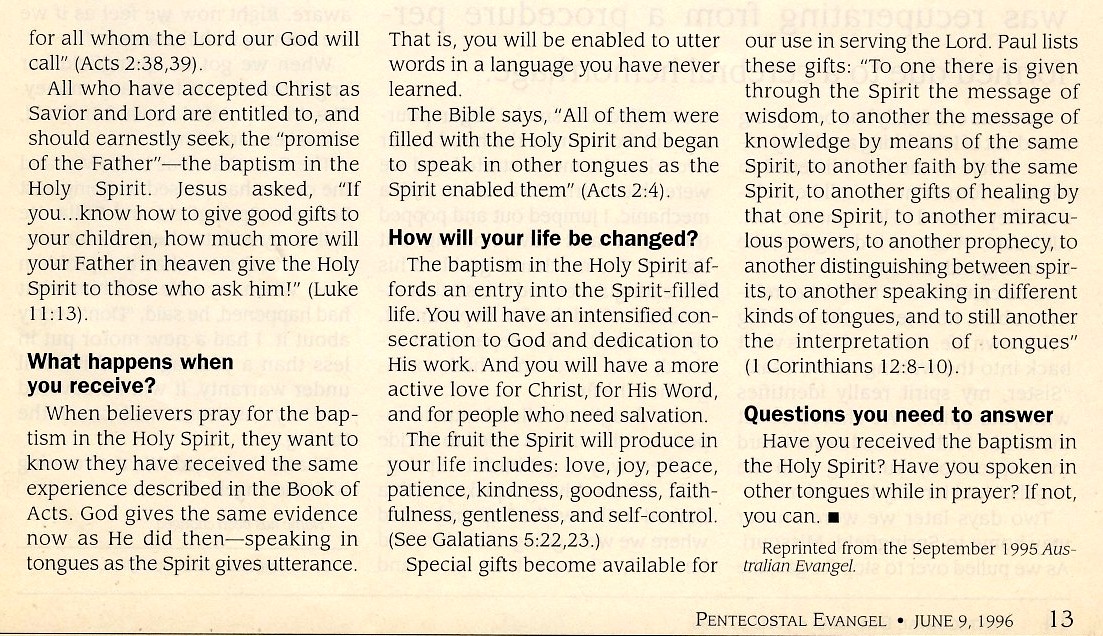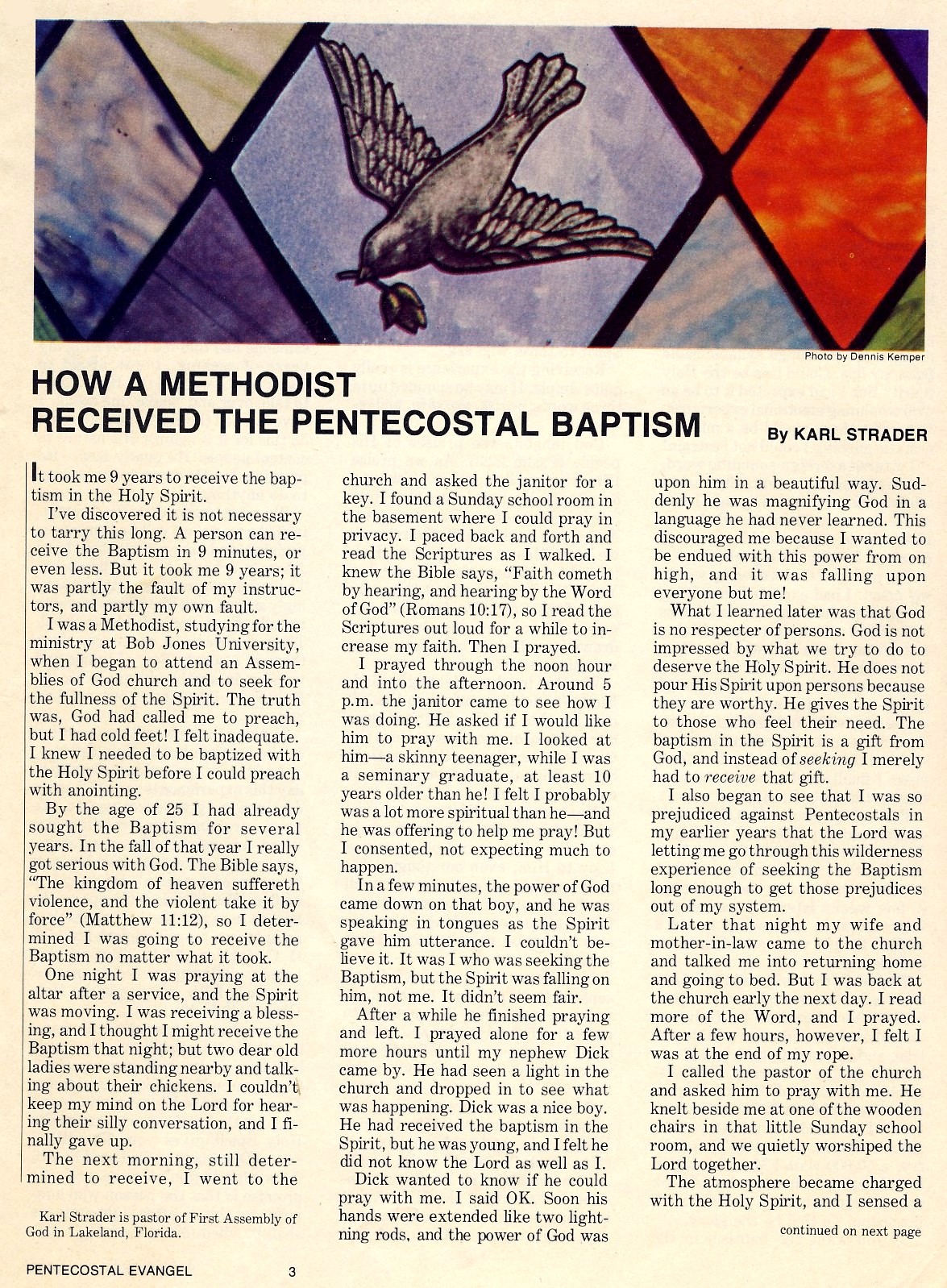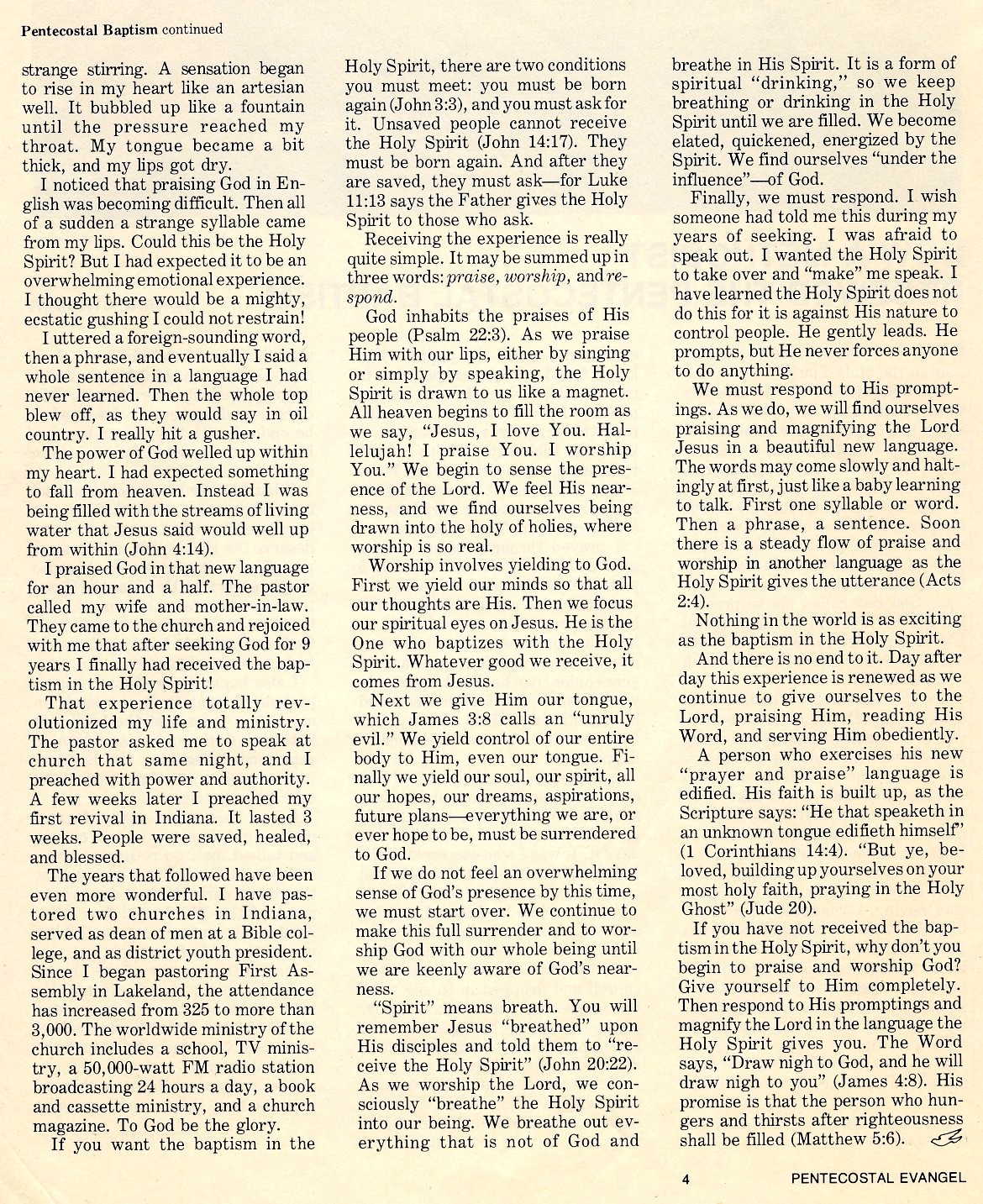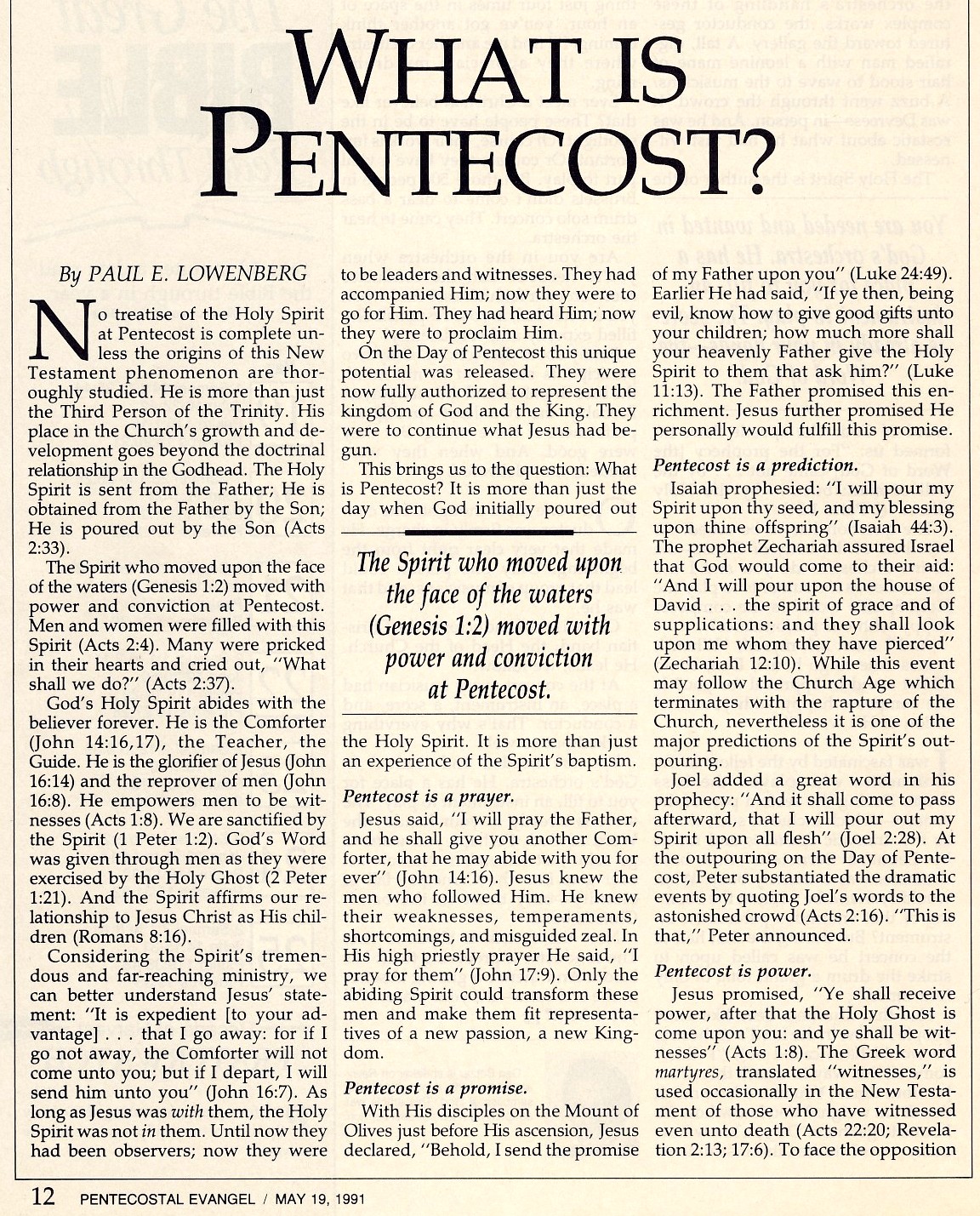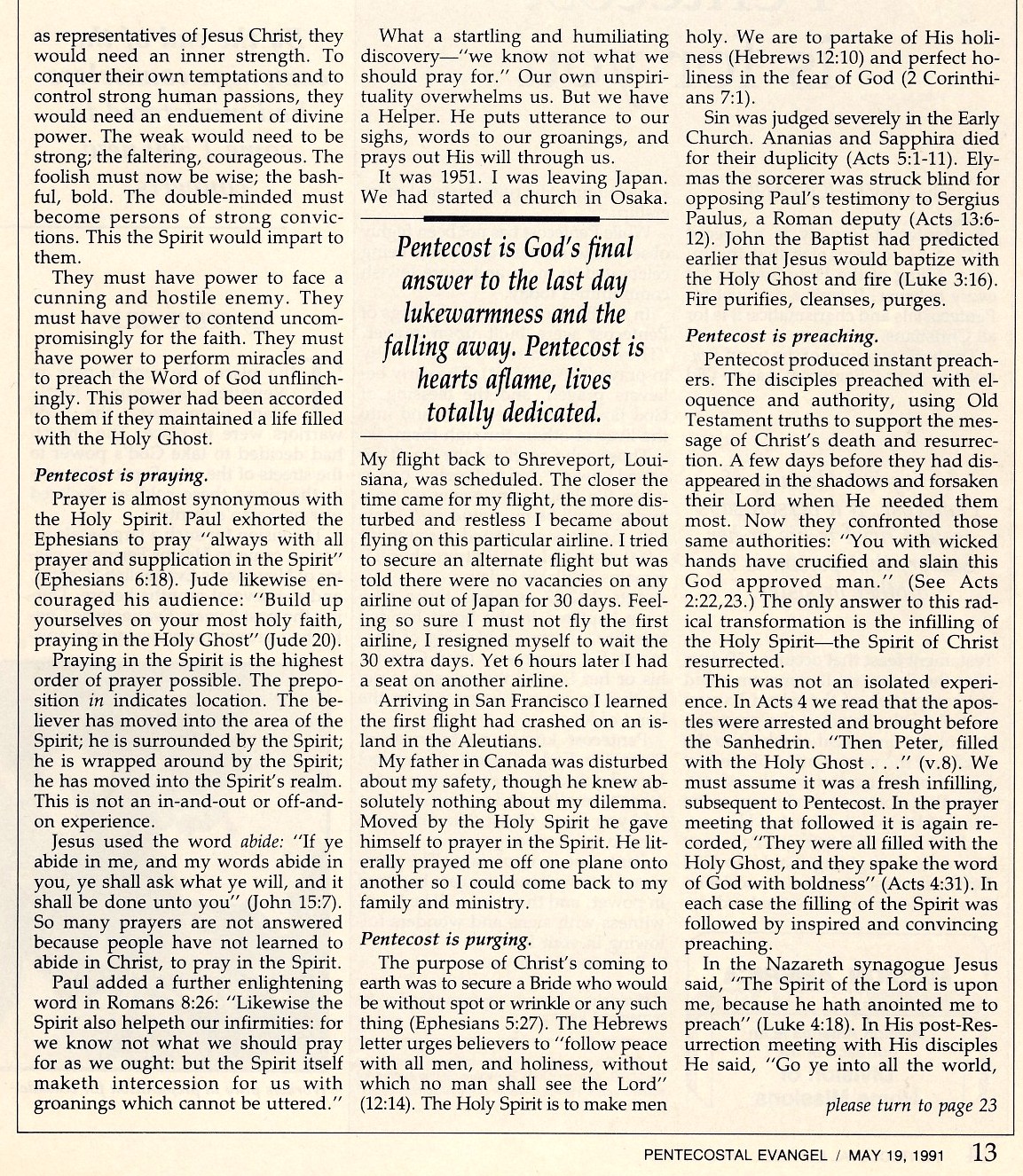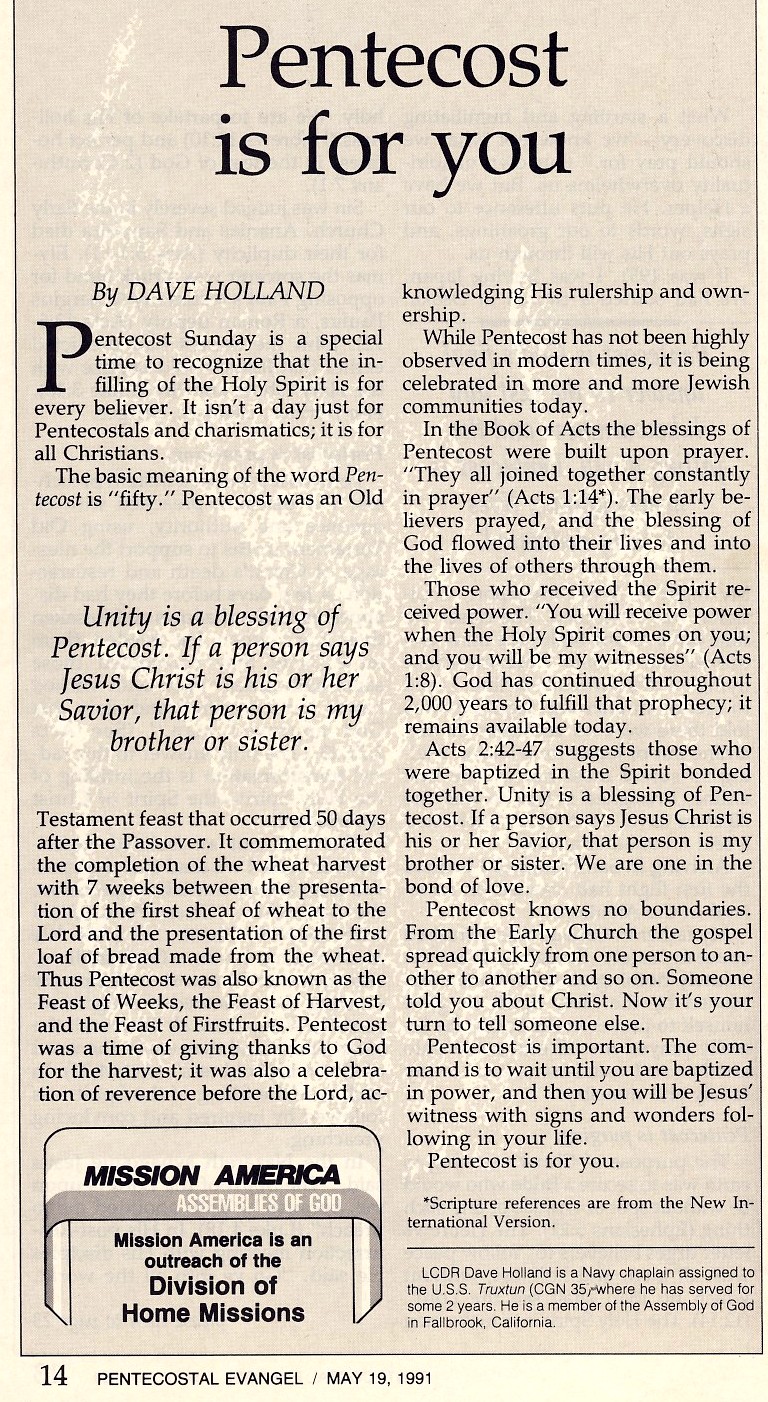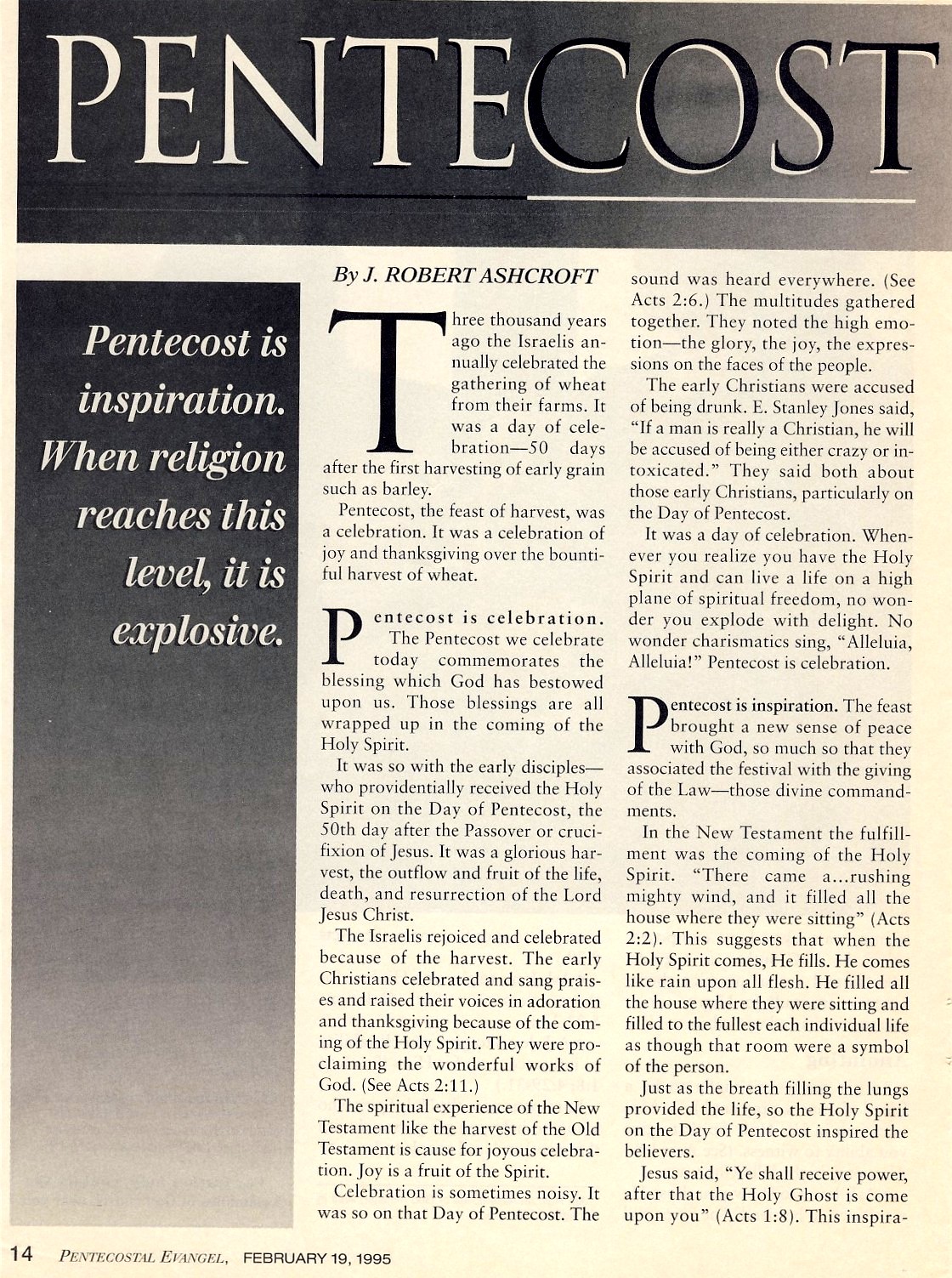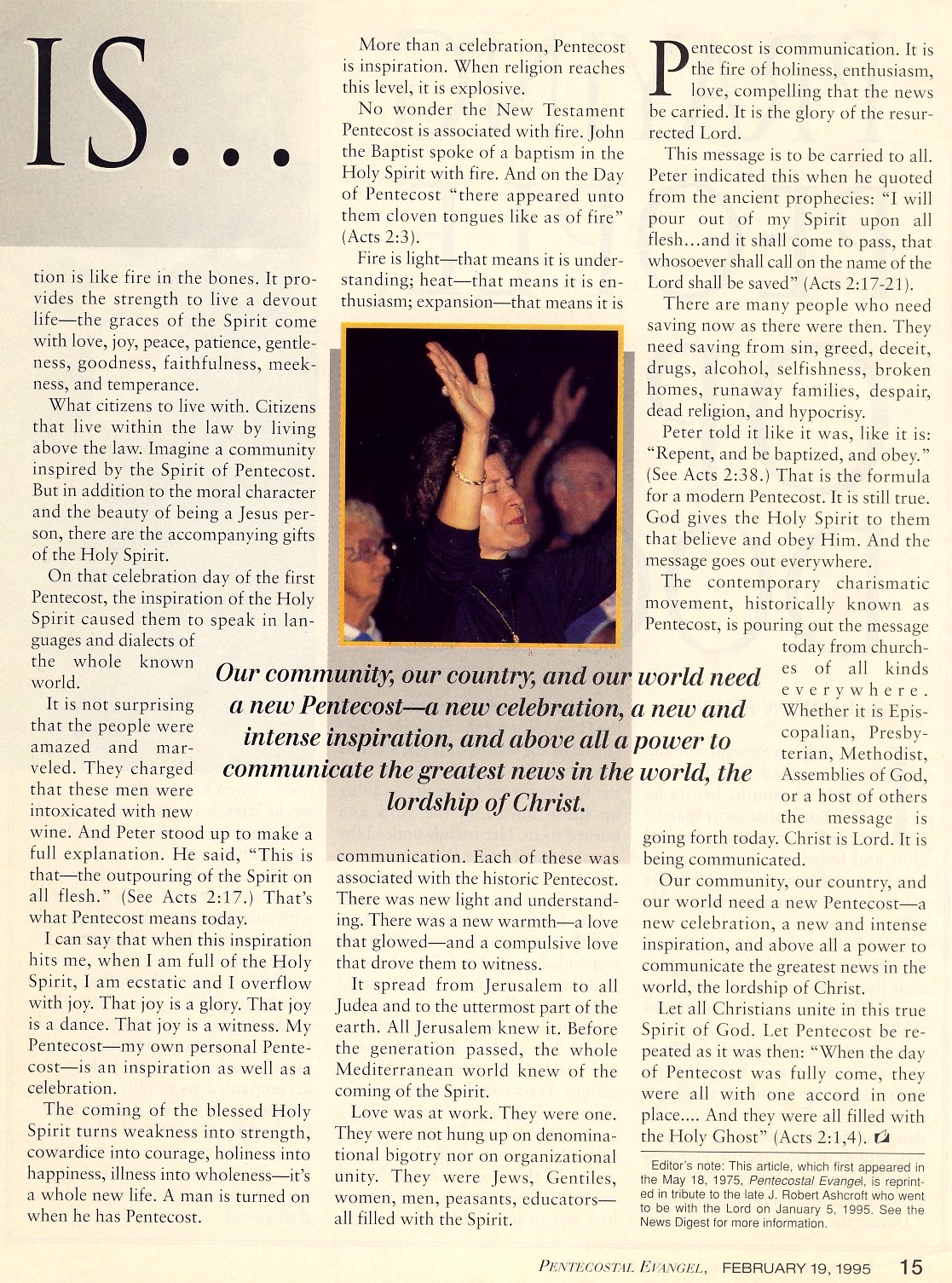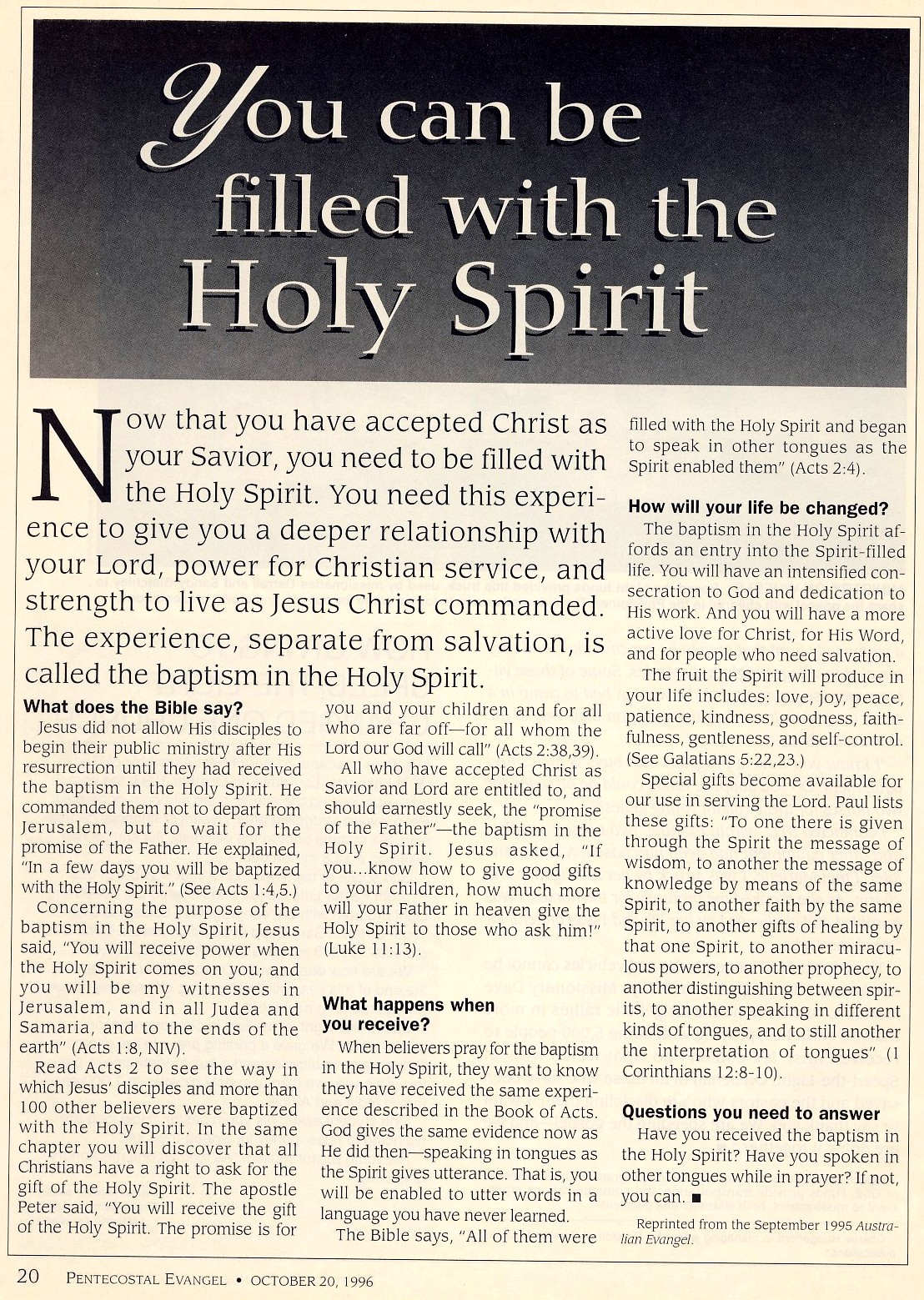


Assemblies of God Sunday School Leaflet
Pentecost Can Be Perpetuated by Ralph W. Harris
The Threefold Purpose Of The Baptism In The Holy Spirit By Zelma Argue
What Good Is The Baptism? By David McKee
How To Receive The Baptism By Donald Gee
Introducing A Child To The Baptism In The Holy Spirit By Thomas M. Loven
That Rushing Mighty Wind By Wayne Barkley
The Purpose Of The Holy Spirit By Harold Carter

The Baptism In The Holy Spirit is a wonderful experience and I recommend it to every follower of the Lord Jesus Christ. You can read about how I received this baptism by clicking on the appropriate link towards the bottom of this web page.
The Pentecostal experience called The Baptism In The Holy Spirit is not to be confused with one's salvation experience. Some non-Pentecostal denominations call the salvation experience by the same name. They should call the salvation experience: regeneration, new birth, or conversion. This can lead to some confusion in some church circles. This is why some Pentecostal writers distinguish the title by adding the words "according to
One of my non-Pentecostal friends, a pastor, came to me one day and wanted to know what the term "Full Gospel" meant. I asked him why he wanted to know the answer to that question. He replied that a new family in town wanted to start going to church and had telephoned him and wanted to know if he pastored a full gospel church. They would not go to a church that didn't have the fullness of the Holy Spirit. I explained to him in love that some denominations deny the Pentecostal experience from happening in their congregations. This is because of unbelief. It is like certain scriptures are cut out of the Word of God and ignored. Therefore, it is not the entire Bible that is preached or believed. A Pentecostal or full gospel church accepted the entire Word of God or the "full gospel" and practiced the New Testament pattern: saved and then baptized in the Holy Spirit with devotional tongues, following with the Gift of Tongues and Interpretation of Tongues in the public worship service.
As well as more gifts of the Holy Spirit in operation. "Full Gospel" is a Pentecostal term for that kind of pentecostal worship service where Jesus Christ is exhalted.
Over the years the Pentecostal Evangel Magazine of the Assemblies of God has published some excellent articles on this subject and it is my great delight to share a few of them with you.
If God had a wallet
THE BAPTISM IN THE HOLY SPIRIT
THE CENTRAL TRUTH:
THE GOLDEN TEXT:
"There is a similar note of sadness about the ministries of Moses and John the Baptist. Both of them talked about great events to come and both missed out on them.
God told Moses to lead the Children of Israel out of Egyptian bondage and into the land of Canaan. He in turn challenged the people to follow him on this courageous enterprise. For many years he was their leader but in the end he was denied the privilege of setting foot in the Promised Land. Moses was to blame for this disappointment because he had disobeyed God at Kadesh. Nevertheless, he must have felt keen pain over it.
John the Baptist told his audience that he baptized with water but Jesus would baptize people with the Holy Spirit. John did not live to see the outpouring of the Spirit at Pentecost, for he was martyred. Unlike Moses, John was not to blame for not seeing the fulfillment of what he had preached. He knew his ministry would be of short duration and would be completed when he had pointed the nation to Jesus. John completed his mission successfully even though he died a violent death at Herod's hand. He was nicknamed "the baptizer," but he pointed to the real Baptizer.
The baptism in the Holy Spirit has many proponents and opponents. Years ago a stand for this experience meant much persecution. There is less of that today. Probably only the Lord himself can adequately explain the present-day phenomenon of the charismatic renewal. Some have misgivings because of doctrinal problems but one thing is sure� God is no respecter of persons or denominations. We must be openhearted in our attitude.
SEEING THE SCRIPTURES
Matthew 3:1-11 (NLT):
2"Turn from your sins and turn to God, because the Kingdom of Heaven is near."
3Isaiah had spoken of John when he said,
4John's clothes were woven from camel hair, and he wore a leather belt; his food was locusts and wild honey.
5People from Jerusalem and from every section of Judea and from all over the Jordan Valley went out to the wilderness to hear him preach.
6And when they confessed their sins, he baptized them in the Jordan River.
7But when he saw many Pharisees and Sadducees coming to be baptized, he denounced them. "You brood of snakes!" he exclaimed. "Who warned you to flee God's coming judgment?
8Prove by the way you live that you have really turned from your sins and turned to God.
9Don't just say, We're safe- we're the descendants of Abraham. That proves nothing. God can change these stones here into children of Abraham.
10Even now the ax of God's judgment is poised, ready to sever your roots. Yes, every tree that does not produce good fruit will be chopped down and thrown into the fire.
11I baptize with water those who turn from their sins and turn to God. But someone is coming soon who is far greater than I am- so much greater- that I am not even worthy to be his slave. He will baptize you with the Holy Spirit and with fire."
Acts 3:1-11 (NLT):
In my first book I told you about everything Jesus began to do and teach
2until the day he ascended to heaven after giving his chosen apostles further instructions from the Holy Spirit.
3During the forty days after his crucifixion, he appeared to the apostles from time to time and proved to them in many ways that he was actually alive. On these occasions he talked to them about the Kingdom of God.
4In one of these meetings as he was eating a meal with them, he told them, "Do not leave Jerusalem until the Father sends you what he promised. Remember, I have told you about this before.
5John baptized with water, but in just a few days you will be baptized with the Holy Spirit."
BIBLE COMMENTARY
Spirit Baptism Promised
Read Matthew 3:1-11
1. It is almost unbelievable that Israel has been without a Spirit-anointed preacher for over 400 years. Not since Malachi's day had there been a bona fide spokesman for God in the land. John the Baptist's generation was ripe for revival and his ministry made a tremendous impact on the nation. Great crowds came to him
2. John the Baptist's popularity was such that even the Pharisees and Sadducees wanted water baptism at his hands. It is hard to believe that these proud religious leaders wanted to jump on John's bandwagon, yet the Bible says many of them came. But just because they were men of high standing did not mean that John would baptize them. He demanded that they first give clear evidence of repentance.
3. The kind of baptism John administered was suitable for his time but it ceased with the coming of Christian baptism. Baptism now means more than it did in John's day. Repentance is still required but baptism now denotes death and burial of one's sinful past and a resurrection to a new life in Christ.
4. John's prophecy that Jesus would baptize with the Holy Spirit is found in all four Gospels.
5. Since John was baptizing people in water, his reference to the baptism in the Spirit is significant. John immersed individuals in the waters of the river. They were plunged completely under; no part of them was left dry. They came up completely saturated. Is this not a fitting picture of Jesus baptizing believers in the Holy Spirit?
FULFILLED AT PENTECOST
Read Acts 1:1-5
1. The words "being assembled together" are rendered "eating with them" in the margin of the American Standard Version. Jesus was sharing a meal with His eleven apostles and probably others were present also. This was not the first time the resurrected Christ had eaten with His apostles
2. Jesus gave this assembled group an important command. They were not to leave Jerusalem until they had first been baptized in the Holy Spirit. This clearly shows that Jesus wants His witnesses to be Spirit-baptized. Possibly the apostles were impatient to get started with their ministries but the Lord told them it was essential that they first receive the Pentecostal enduement. The baptism in the Holy Spirit is not a mere option. It is a prerequisite for effective Christian service.
3. Another name for the baptism in the Holy Spirit is the promise of the Father. Jesus reminded His apostles that they had heard Him speak of this promise before: "which ... ye have heard of me." This occasion is recorded in
4. In the Early Church the baptism in the Holy Spirit was inseparably connected with salvation. No one expected anything but that individuals would be filled with the Spirit after they were saved. We read of no long, drawn-out period of delay between conversion and the infilling of the Spirit. When Peter gave his altar call on the Day of Pentecost he urged his hearers to repent and believe so they could not only be forgiven but filled with the Spirit. This is the normal pattern of the New Testament.
OFFERED TO ALL GENERATIONS
Read Acts 2:14-21
1. What gathered that large crowd around the disciples? It was the speaking in tongues. Somebody had to give an explanation of this phenomenon. It was Peter who stood up and became the spokesman for the other apostles. His sermon began with a rebuttal of the charge of drunkenness. If the accusation was made in jest, Peter deftly handled it in good humor. He said 9 a.m. was an unlikely hour for 120 people to be intoxicated. He then went on to identify with Joel's prophecy what the people had seen and heard.
2. Peter did not rely on human arguments when he stood before the multitude. He based his reply on Scripture. At that moment the Holy Spirit revealed to him that the experience was the fulfillment of
3. The Pentecostal experience is for "all flesh." Although Peter's immediate audience was largely Jewish he made it clear that the baptism in the Holy Spirit was for Gentiles as well. It is for every believer regardless of race or national origin. Peter said that all who answer the call to salvation are candidates for the gift of the Holy Spirit.
4. The prophecy of Joel further indicates that all classes of people may receive the Spirit. The differences between sex, age, and social status mean nothing to the Holy Spirit. The Pharisees despised the common people and did not give women proper respect. But Jesus preached the gospel to the poor and honored womanhood.
5. Peter talked about visions and dreams in connection with the baptism in the Holy Spirit. Did Joel mean literal ones or symbolical? Possibly both. When required, we believe the Holy Spirit can give actual visions and dreams for the fulfillment of some purpose. Also, we believe the Spirit can so fire a person's imagination that he sees what can be accomplished for God by faith. It goes without saying that literal visions and dreams should agree with what the Bible teaches.
6. Peter's reference to the signs mentioned in Joel's prophecy
1. What word below best describes the kind. of man John the Baptist was?
2. Did John baptize everyone who asked him to? Explain your answer.
3. How would you explain the wide acceptance of the baptism in the Holy Spirit in our day?
4. Why does the Bible call the Pentecostal experience a baptism?
5. What did Jesus mean by calling the baptism in the Holy Spirit "the promise of the Father"?
6. Which of the Old Testament prophets is frequently called the Pentecostal prophet?
7. How important are visions and dreams?
1. Answer the following statements true or false (T or F) in the blank after each.
Quoted from: LIFE IN THE SPIRIT, MARCH 20, 1983, STUDY 3
ADULT LESSON FOLDER (ISSN 0190-4027) is published quarterly � 1982 by
The best things in life
"There is a new outpouring of the Holy Spirit for each new generation."
"We are told that William Booth, founder of the Salvation Army, cried out on his deathbed: "My God, what a tragedy that the second generation has never stayed pure."
The tragedy is traced very easily through the history of Israel and the church. God raises up a leader such as Luther, Knox, Wesley, Booth, and a mighty revival results. It spreads like a forest fire. But then within 30 or 40 years a new generation arises which inherits the reputation of its predecessors but not their consecration or experience with God.
Ritual, program, and organization take the place of a pure gospel. Instead of glorying in the Cross and the moving of the Holy Spirit, they begin to glory in their beautiful churches, their trained choirs, and their highly educated ministers. And the revival fires die as they lose the power and blessing of the Holy Spirit.
It need not be. But it has happened over and over again.
How wonderfully God worked on behalf of His chosen people Israel. When Isaiah asked, "To whom hath the arm of the Lord been revealed?" Israel could shout in reply, "To us."
Egypt's Pharaoh had shackled Israel with the chains of slavery and slaughtered their infant sons. They were in danger of extermination, but God delivered them by mighty manifestations of His power.
Like a tidal wave, 10 devastating plagues swept over the land. When at last the firstborn in every home was slain by the avenging angel, Pharaoh capitulated and begged Israel to leave.
At the Red Sea, with mountains on either side and the flower of Egypt's army at their rear, the children of Israel seemed doomed. But God rolled back the waters to form a corridor for the triumphant march of His people.
What a history of miracles was written during their 40-year stay in the wilderness! Water flowed from the rock to satisfy their thirst. God rained manna from heaven to care for their hunger. Thousands of quail fell at their feet to provide meat. Their shoes and clothing would not wear out.
What miracles God performed for the generation that marched into the Promised Land! Jordan's torrential waters piled up so they could walk across on dry ground. Jericho's walls fell before their faith-filled shout. Hailstones from heaven routed their enemies, and the sun stood still so they could have a complete victory.
But then came a sad anticlimax, as dark and awful as their victories had been glorious.
No wonder God forsook them and delivered them into the hands of their enemies.
Is there not a lesson here for our Assemblies of God fellowship? As one generation replaces another, is there not a danger we may go the way of all the other revival movements and become just another religious organization?
It has happened over and over again. But it need not be.
I remember speaking along this line in a chapel service at Central Bible College 40 years ago. I had just been called to Springfield to establish a national youth department in the Assemblies of God, and I was greatly burdened for the rising generation. I wanted to see this Pentecostal revival perpetuated.
When asked to address the students at Central Bible College I felt a special urgency, for here were hundreds of future pastors, evangelists, missionaries, and leaders who, in a measure, would hold the future of our Movement in their hands.
My subject that night in 1943 was, "A Crisis, a Challenge, and a Cure." I endeavored to impress upon the congregation the crisis; I presented them with the challenge; I called them to dedicate themselves to proving that the prophets of failure were wrong.
Must Pentecost follow the tragic pattern described in Judges chapter 2? Was such a fate inevitable? Must history repeat itself?
"No," I told the students. "I know that it seems to be inevitable� but we are serving a God who refuses to bow to the inevitable."
"I know that history repeats itself and that it may take a miracle to change that course� but we are serving a miracle-working God."
"I know that it seems impossible� but we serve a God who 'specializes in things thought impossible.' "
Stirred by these thoughts, I shouted, "Hallelujah!"
And then it happened. The audience that had been rather quiet up to this point suddenly erupted with a sound like thunder. In a moment all the students were on their feet praising God and praying at the top of their voices.
It didn't even begin to die down for over 2 hours, and many of the students continued praying into the early morning hours.
There were remarkable manifestations of the Holy Spirit. Gifts of the Spirit were in operation. One young man, who had lost his voice while praising the Lord, began to speak of Calvary in the sign language� which he had never learned.
Across the years since that time, many ministers who were present in that service have told me what God did for them and for their future ministries that night.
It was a sovereign move of the Holy Spirit. I had spoken of the crisis and the challenge, but God himself had given the cure.
This Pentecostal revival will be perpetuated by the same thing that gave it birth� by an outpouring of the Holy Spirit. This is our distinction. What made Pentecostals different from all other believers was the conviction that what happened on the Day of Pentecost and in the Early Church was possible in this 20th century. There was a dynamic, a definite experience, a baptism in the Holy Spirit that revolutionized lives. They loved the manifestations of the Spirit. They gloried in the glossolalia; it was the initial physical evidence of the baptism in the Holy Spirit.
Let us not deny these operations of the Spirit. Let us never weaken our stand concerning them. Let us never relegate them to services where believers will not be embarrassed. We have no excuse for our existence as a Movement except for our special emphasis upon this spiritual treasure which the Lord has entrusted to us.
President Franklin D. Roosevelt once declared: "For democracy to survive, it must be reborn in the hearts of each new generation." This is even more true in relation to Pentecost. The Movement is made up of people. If Pentecost is reborn in each believer of a generation, the Movement will be perpetuated.
In the words of William Booth, "0 God, do it again." And again! And again!
I believe we are living in the time that was prophesied by Joel. Let us not be content until the promise has been fulfilled: "I will pour out my Spirit upon all flesh; and your sons and your daughters shall prophesy, your old men shall dream dreams, your young men shall see visions: and also upon the servants and upon the handmaids in those days will I pour out my Spirit"
This article quoted from the
We are called by God to
"Every blessing of the soul is brought to us by the ministry of the Holy Spirit. From the first heart wooings of conviction to the final triumph� being caught up to meet the Lord in the air� all God's blessings are ministered to us by the Holy Ghost. Yet the Baptism in the Holy Spirit is a distinct experience, as clear-cut, as outstanding, as unmistakable as being baptized in water. It is a definite experience.
Many dear people say, "I have felt the presence of the Holy Spirit many times. Therefore I am sure I have the Baptism." No, the presence of the Holy Spirit to help you is not necessarily the Baptism.
The lost hat
So we were praying. Many were being saved in the services. Our friend came several times to the services, but did not go forward. Then to the dismay of the wife his working hours were changed to night which completely cut him out of the services. He could not even attend the afternoon services. We were all sorry, but kept on praying.
One day our friend, who was foreman in a large steel factory, lost his hat. He and his wife looked everywhere but could find no trace of the hat. For two days he wore his cap, and the puzzle remained unsolved.
On the third day his wife found it in the strangest place. It was down in the coal bin. When he came home she showed it to him, and told of the strange place where she had found it.
With an embarrassed smile he looked at her and said:
That was the blessed work of the Holy Spirit in convicting and saving. But the Baptism is beyond this. This dear brother started in immediately praying to be baptized with the Holy Spirit.
Not sanctification
Being baptized in the Holy Ghost is being immersed just as definitely as being baptized in water. To be baptized is to be immersed; that is, to go completely under. Some may be satisfied to receive a sprinkling of the blessing and to call that the Baptism, but to be baptized in the Holy Ghost is something much deeper than that.
INWARD (The earnest of our inheritance)
Now this is exactly what the Bible tells us about the Baptism in the Holy Spirit. We are told in
This experience which Jesus called the Promise of the Father is the earnest of our inheritance! It is a token of the glory which shall be ours. This is the inward purpose of the Baptism of the Holy Spirit.
OUTWARD (Power for witnessing)
"Ye shall receive power," Jesus said, "when the Holy Spirit is come upon you: and ye shall be my witnesses both in Jerusalem, and in all Judea and Samaria, and unto the uttermost part of the earth"
Here on the railroad track is a powerful locomotive all ready to go. The boiler is filled with water. The fire has been kindled and is burning, very hot. Someone touches the valve for the whistle. "Whoo, whoo," goes the whistle. But the engineer does not let all the steam go out through the whistle. Not at all. Instead he starts a steady pull. "Chug-a-chug, chug-a-chug," the engine goes and slowly, steadily, surely, its power is used to tug at the series of passenger coaches. Gradually it gains greater speed and momentum until the power of the steam, produced by the fire and the water, has carried the trainload of precious human lives safely to their destinations. Nor will the Bible-taught Christian, endued with the power of the Holy Ghost, let it all go out through the whistle, through noisy manifestations, but will use that God-given power to draw precious hearts to Jesus. He will never stop using that power till souls are led all the way safely Home.
UPWARD (Sealed unto the day of redemption)
The trombone
The Lord seemed to ask me as I knelt there how I prepared my own instrument for use. "Lord, when I want to get it into the very best shape to use, I get it perfectly clean. I run pure, clean water through it. I see that it is clean, inside and out."
Then it seemed that the Lord said, "Is that all?" Instantly I remembered that it was not. "No, Lord. If I used it then, there would be friction and strain, and unnecessary wear on the instrument. After it is clean I pour on the oil. Then the friction is gone. After it is oiled, just a breath, just a touch, and it leaps quickly into a perfect response."
That is it, He showed me. The instrument must first be washed and cleansed. Then it needs oil. The Lord wants to pour the oil on, the precious oil of the Holy Spirit. Then, when the oil is there in abundance, He can use the instrument. Just a whisper from the Lord, just a touch, His breath upon us- and the chosen instrument will respond to the Master's desire, and to His will."
This article quoted from the
Exercise daily
"Does the evangelical Christian need to be baptized in the Holy Spirit?
At a recent gathering of Christians in England the question was raised: "Does an evangelical Christian need to be baptized in the Holy Spirit?"
"We can understand a backslider needing a renewed experience with God," they said. "We can see why a defeated, moribund Christian needs to be revitalized; but what about a man who is genuinely born again and who is serving the Master to the best of his ability? What does the Pentecostal message have to say to evangelical Christians?"
THE QUESTION indicates two dangers which Spirit-filled believers must avoid in sharing with others their testimony concerning the Pentecostal baptism.
Do not minimize the wonder of the new birth.
We all know the negative seeker who complains, "I have no joy, no victory, no power. I need the Baptism."
One is tempted to say, "You poor fellow, don't you have Jesus?"
Thank God for the transforming wonder of the new birth. When a repentant sinner, through the miracle of the new birth, becomes a partaker of the divine nature, something marvelous takes place. He experiences a new creation. Old things pass away, and all things become new.
The 120 believers who received the Spirit in the Upper Room were not a bunch of poor defeated believers. On the contrary, they were men and women filled with a spirit of praise and thanksgiving who could live in perfect harmony with one another. Even before Pentecost they were united in fellowship and were continually in the temple, worshiping and praising God. Perhaps they had a higher level of praise and unity before experiencing the Baptism than some of us appear to have afterwards!
Let us, in our loyalty to the truth of the baptism in the Spirit, never lower the standard which God has set for regenerated men and women. Let us not be afraid to point defeated seekers to Calvary, to experience the victory of the Cross in their personal lives; and let us not hesitate to proclaim that God's standard of holy living is for all His children.
Never suggest that the Baptism will solve all spiritual problems.
Sometimes an enthusiastic brother or sister will declare, "Get the Baptism, and you'll have it made. All your sermons will then produce conversions; all your sick will be dramatically healed; and your church will be filled with eager seekers."
We all know what is meant. Thank God, when a man or woman is baptized in the Holy Ghost, their words will be no longer cold and formal but words of authority which come from God.
We rejoice that the gifts of healing and miracles, in disuse so long because of the church's sin, are being rediscovered in our day to Christ's glory. We thank God that a Spirit-filled preacher will never lack hearers to listen to God's message through him. But we must never teach or imply that a Spirit-filled ministry will always bring outward "success."
John the Baptist met a lonely end in prison. Stephen the martyr fell under the bloody stones. Philip the evangelist melted into the obscurity of Caesarea after his dramatic ministry in Samaria. All these were men filled with the Holy Ghost, men whose knowledge of God and whose fellowship with the living Christ kept them true even in apparent failure.
WHAT THEN does the baptism in the Holy Spirit bring to a life which is already Christian? Out of personal experience I would mention four things.
It brings an immediate awareness of the Lord.
Before the Baptism, many of us spoke of Jesus because others had told us the correct words: we repeated the things we had read, but could not speak as prophets of what we had seen. But when the blessed Holy Spirit came in His fullness, He took the things of Christ and made them real to us, so that we could cry, in adoring wonder, "I have heard of thee by the hearing of the ear . . . but now mine eye seeth thee"
It brings a release in praise.
After the Baptism we discover that there are situations in which we cannot "pray through," situations where ordinary prayer is not enough. What a holy moment it is when the Holy Spirit within us teaches the soul to praise God in other tongues, rebuking the power of evil, and releasing the soul to praise God. Such Spirit-filled believers have the high praises of God in their mouth and a two-edged sword in their hand to bind their kings with chains and their nobles with fetters of iron.
To stand in the midst of human need, human baseness and treachery, and praise the name of the Lord is a ministry which can only be exercised by Spirit-filled believers, a ministry into which we are led by the baptism in the Holy Spirit.
It gives us a deeper awareness of the occult.
We are living in the last days when there is a tremendous resurgence of demonic activity, activated by an enemy who knows his time is short. Anyone who has experienced a genuine baptism in the Holy Spirit will soon be led to follow his holy Master into the wilderness to be tempted by the devil and to experience the sacred mystery of the promise, "I give you power . . . over all the power of the enemy: and nothing shall by any means hurt you"
It produces a tender spirit before God.
One of the strange paradoxes about being filled with the Holy Spirit is that one is left with a deeper hunger than ever before. The baptism in the Spirit, instead of satisfying the soul's longing for God, intensifies it; and the man who has "found" God seeks Him more earnestly than the casual dilettante in spiritual things.
The baptism in the Holy Spirit brings the soul into a new realm of brokenness, into an awareness of personal unworthiness which is matched only by the sense of Christ's all-sufficiency. "To have God and yet to seek Him," in the words of A. W. Tozer, "is the soul's paradox of love. Scorned indeed by the easily satisfied religionist, but justified in happy experience by the children of the burning heart."
Thanks be to God for the promise of the Father which is for all His children. Thanks be to God for the Spirit of truth, whom the world cannot receive, and for the promise, "For whosoever hath, to him shall be given, and he shall have more abundance"
This article quoted from the
God can mend your broken heart
"In attempting an answer to the question, "How can I receive the baptism in the Holy Spirit?" we shall not repeat our personal testimony, delightful though that task would be. For God deals with different people in different ways.
The weakness of relying on a personal testimony is that people then expect God to meet them in just the same way. Actually while some receive the Baptism immediately, some receive only after long tarrying. Some receive easily, some after intense spiritual conflict. Some in a crowd, others when alone. Some kneeling, others sitting or standing or prostrate on the floor. Some receive with laughter and great joy, others with tears and great brokenness. Some with much noise and commotion, others very quietly. Some through the laying on of hands, and some without.
The best way to learn how to receive the Baptism is to prayerfully search the Scriptures on this matter; they are principally
This simple procedure will settle that question which seems to trouble some people so much, as to whether they should expect to speak in tongues when receiving the baptism in the Holy Spirit. They certainly spoke with tongues in Bible days. If we accept the position that the Baptism we should seek must be a Bible baptism, then it follows that we should expect the Bible evidence. And, thank God, He gives it today, exactly as of old.
Some will ask, "But what is the use of tongues?" They ought to realize how much such a question is a reflection on the wisdom of the Almighty! God ordained tongues as the initial evidence of this Baptism, and even the "foolishness of God is wiser than men"
One use of tongues is that they satisfy the believer that the Holy Ghost has really come. They clinch the matter. That single evidence, standing alone, was sufficient to satisfy those deeply prejudiced Jewish believers who came with Peter in the home of Cornelius. "For they heard them speak with tongues"
But "do all speak with tongues?" Paul's question in
Two conditions of receiving this Baptism are stated very clearly in
Repentance is a change of mind. Sin is an attitude of rebellion against the will of God. Repentance is an act of the will that ends the rebellion and submits to the will of God. Saints may need to repent quite as much as the unregenerate.
Submission to water baptism was an initial action by which converts proved the reality of their repentance. There may be other tests. When you start seeking the Baptism, the Lord may deal with you about making restitution or taking some other step of obedience to himself. He is testing the reality of your repentance.
Never think, however, that by your obedience or service or sacrifices you make yourself worthy to receive the Baptism. It is not a reward; it is a gift. It is through grace, and grace alone, that any believer is ever baptized in the Holy Spirit.
"Remission of sins" is an absolutely essential preparation for receiving the Baptism. "Remission" means "a loosing, a forgiveness," and is something I receive as a pure gift from God. Remission and forgiveness of sins are inseparably connected with the precious blood of Jesus
It is written, "The blood of Jesus Christ his Son cleanseth us from all sin"
The position to take when seeking the Baptism is to stand upon God's promise. It is stated in
Do not stand upon someone else's testimony. Do not stand upon the teaching of some leader, however helpful and true. Do not stand upon your hopes because a revival is on and others are getting blessed. Stand upon God's promise. If you are not sure what the promise is, 10 minutes with your Bible will help you more than 10 hours on your knees.
Grasp your spiritual birthright. Claim the promise. Note the fourfold prophecy that Jesus shall baptize His followers in the Holy Ghost
"As many as the Lord our God shall call" includes you. The "call" here is the gospel call. It exactly coincides with the call to repentance and faith of the preceding verse.
Drop on your knees and claim these "great and precious promises." Place yourself in the hands of the Lord Jesus and let go. Remember how you surrendered yourself unreservedly to the minister who baptized you in water? This was essential before he could immerse you. In the same way you must yield to the Lord Jesus and let Him baptize you in the Holy Spirit. Let go� and let Him do it.
You want a Bible baptism with the Scriptural evidence of being baptized in the Holy Spirit. God wants to give it to you. Then close your ears to all that would discourage you. Keep yourself among those who believe in it. Base your faith in the written Word.
Yield without fear to the Holy Spirit. Submit to Him with simple, childlike trust. You too will receive this marvelous Baptism which is enjoyed by so many Christian believers all over the world. All that the Church of the first century enjoyed, the Church of the 20th may also experience. At the center of it all is "Jesus Christ, the same yesterday, and today, and for ever"
This article quoted from the
Can't sleep?
"Among the stated objectives for Assemblies of God Sunday schools is this: "To encourage each believer to receive the baptism in the Holy Spirit and maintain a Spirit-filled life."
How should we define "each believer"? Does this mean each adult believer? Are not our children included?
In an article, "And Your Children," which appeared in the Fall 1979 issue of Paraclete, John Lancaster observed, "We need a visitation of the Holy Spirit upon our children. Only the Spirit of the Lord can raise a standard against the incoming flood of wickedness. The wonderful thing is that the God of Pentecost has the children in mind. He is no respecter of age groups."
There is a great deal of scriptural support for Brother Lancaster's statement. It is important to remember Joel's prophecy concerning the outpouring of God's Spirit includes the promise, "Your sons and your daughters shall prophecy"
Consider the pressures and influences on our children today. Our world calls abortion, homosexuality, and divorce normal. Our children are exposed to things in the various media every day which would have been considered shocking a decade ago. Thus we recognize the need for the power the Holy Spirit brings into a life. Now more than ever we need to introduce our children to the baptism in the Holy Spirit.
Let us remember that our children are not immune to spiritual experiences. In fact, Jesus referred to the openness of children to the things of God as an example adults should follow. He said: "I tell you the truth, unless you change and become like little children, you will never enter the kingdom of heaven. Therefore, whoever humbles himself like this child is the greatest in the kingdom of heaven"
Two of my most vivid childhood memories are of accepting Jesus as my Saviour in a vacation Bible school at age 5 and of being baptized with the Holy Spirit in a small church in North Dakota at age 8.
I believe in introducing children to the baptism in the Holy Spirit. How can we do it?
By Teaching
By the time a child reaches the junior age level he has been introduced to spiritual concepts and is ready to discover God's requirements for decision and spiritual growth.
An in-depth study of Assemblies of God teachings called Foundations for Faith is an interesting, exciting indoctrination course designed especially for sixth graders. When children understand Biblical teaching on the baptism in the Holy Spirit, a desire is created to experience this wonderful blessing.
By Example
It is important that children understand the Pentecostal experience as a normal part of the Christian life. If the only time children are exposed to the teaching or experience of the baptism in the Spirit is during an unusual move at camp or in an evangelistic crusade, there is danger they may perceive the experience as a spiritual status symbol.
However, we must provide settings, such as camps and retreats, when children are free to seek God. When they enter these situations having received proper teaching concerning the baptism in the Holy Spirit, then God will honor His Word, and our children will receive the Spirit as He promised.
Yes, the promise of the Holy Spirit is not only for adults, but for our children also. Let us take every opportunity to teach them about the Baptism. Let us provide opportunities for them to seek God and be filled with the Holy Spirit. "For the promise is unto you, and to your children"
This article quoted from the
When we depend on ORGANIZATIONS,
"It was the day of the Feast of Pentecost, the great feast of the firstfruits of the harvest. In an upper room the disciples were waiting. We read in
There are several types of the Holy Spirit in the Bible. The dove signifies the peace and gentleness which the Spirit gives. Fire symbolizes the burning out of the fleshly nature and carnal desires as the Spirit works in us. Water is used to illustrate the washing of our hearts by reading God's Word and the refreshing we receive in the Holy Ghost.
Then there is wind. Wind involves at least two things: power to move things, and fresh air to breathe.
Who has not seen kites flying, windmills turning, sailboats moving, and trees swaying, all witnesses to the movement of air which we call wind.
Likewise, whenever the Spirit is in operation, there will be motion. There is no power like Holy Ghost power. Those who have lived Christian lives without the baptism in the Spirit testify that power came into their lives when they were baptized in the Holy Ghost.
Those who have been in a place where air to breathe was in short supply can testify how wonderful it is to have any movement of air bringing life-giving oxygen. We need a continual breathing of spiritual life into our souls, and only the Spirit can bring it!
Almost 20 centuries have come and gone since that first outpouring of the Spirit on the 120 in the Upper Room. And the mighty rushing wind has begun to blow again! Thank God, it has brought movement, power, and fresh air!
When the Spirit must. He moves with gentle breezes upon souls and hearts. He can be so tender when there is need for a gentle leading of an individual or a group unfamiliar with His work and power.
But as He moves upon many individuals, the overall result is a rushing mighty wind of Holy Spirit power which is sweeping across denominational lines, breaking down traditions and long-standing barriers.
What does the Spirit do as He comes in? He sweeps out the chaff and debris of self; He sweeps in some Holy Ghost excitement! He gives power to witness and overcome temptation. He makes Christ much more real and personal.
He gives the desire to be involved in spiritual activities. No one can praise and worship like Spirit-filled people! In fact, there must be expression and activity from the heart for the Spirit to flow. Jesus said the Spirit would flow out of the believer
People in Jerusalem on that memorable Day of Pentecost came running from all quarters crying, "What meaneth this?" Peter, through the wisdom of the Spirit, had the answer based on the Word of God.
Today, as then, the whole Christian world stands amazed at the move of the Spirit and says in wonder, "What does it mean?"
Religion editors and theologians look at Pentecostalism and the charismatic movement with a new and questioning look. Charismatic conferences hold their evening rallies in stadiums because no convention hall can accommodate the crowds. Surely that "rushing mighty wind" is blowing as never before!
No one can understand how God moves today in so many ways and upon such a variety of groups and persons. Attempts to program or channel the mighty rush of Holy Spirit power around the world today would only result in confusion.
But, thank God, we can be a part of what God is doing. We can rejoice that at last God is able to pour upon many, many people the blessings and the power which the Spirit brings.
May all flesh be moved upon with continued blowing of that rushing mighty wind as the day of Jesus' coming draws near."
This article quoted from the
Daniel wasn't thrown into a lion's den
"Every church needs a shepherd. Every pastor needs a pastor. Every Christian movement needs a leader. It is presumptuous when any Christian body feels that the destiny of the Church is in its hands.
There is a Pastor above all pastors. He is the Third Person in the Godhead, the glorious Holy Ghost. He is the One whom heaven has appointed to guide the affairs of the Church.
Before He left this earth, Jesus talked about the Holy Ghost: "When he, the Spirit of truth, is come, he will guide you into all truth: for he shall not speak of himself; but whatsoever he shall hear, that shall he speak: and he will show you things to come. He shall glorify me: for he shall receive of mine, and shall show it unto you"
Jesus taught that the real Overseer of the Church would be the Holy Ghost. Throughout His own life He had been guided in all things by the Holy Ghost. The Holy Ghost led Him into the wilderness where he declared His sovereignty over the power of the devil. The Holy Ghost led Him into Galilee where He announced His calling in the synagogue in Nazareth. The Holy Ghost was His Enabler in all His uttered words and in all His miraculous works.
Acts chapter 2 gives us the historic model of Pentecost as a basis for seeing the workings of the Holy Ghost. No church can be Biblical if it fails to conform to the model of Pentecost. Therefore, we need to see what happened at Pentecost. We need to see the Person of the Holy Ghost in order to better understand the purpose of the Holy Ghost in the ministry of the church today.
1. The Holy Ghost came to convert the church.
The church needed conversion. Judas had betrayed our Lord! Peter had denied Him. The apostles had forsaken our Lord in the hour of His arrest and trial.
What is more, on the lofty slopes of Olivet all the brethren had asked the Master a question that revealed their woeful ignorance of the kingdom of God. They wanted to know if the Lord was then ready to restore again the kingdom to Israel. They still had a faulty concept of what God's kingdom really was. The church needed conversion.
It is unfortunate that we have consciously or unconsciously promoted the doctrine that people can be converted just once. Where did we get that idea? It is certainly not New Testament grounded. What would have happened to Simon Peter if there were only one conversion? Jesus knew he needed another conversion and said, "Simon, Simon, behold, Satan hath desired to have you, that he may sift you as wheat: but I have prayed for thee, that thy faith fail not: and when thou art converted, strengthen thy brethren"
The American church needs to rediscover the converting powers of the Holy Ghost! We have programs, but the life of God is not in them.
I was in Crystal City, Colorado, some weeks ago. I was shown the remains of what was once a big bank where the gold out of the huge mountains was deposited. Now the only remains of the bank are broken pillars and leaning walls!
Is this a symbol of the church in America today? We have great ecclesiastical organizations. What we desperately need is the energizing and life-giving power of the Holy Ghost.
At Pentecost "there came a sound from heaven as of a rushing mighty wind"
There is so much in the best believer's heart that only the wind of God can blow away. Only the wind of the Holy Ghost can blow away unbelief! Only the wind from heaven can blow away doubts and fears!
Peter thought he had courage to stand with Christ in the hour of testing, but he failed. He needed the wind of God. Only this Holy Wind can awaken many of our sleepy churches out of their stupor and help them to see we are living in the latter days before the coming of the Lord! Only the Wind can blow away our petty theologies, our social cliques, and all our secret sins, and bring us before God in true holiness and righteousness.
The conversion at Pentecost was a total conversion. The Wind "filled all the house where they were sitting"
Peter was not exempt. He needed the Wind to blow on him! The ushers at the door were not exempt. Everyone in the Upper Room needed the Wind to blow away all their dross and worldly corruption and fear so the gathered believers could see Jesus!
There has been a lot of talk in our day about church renewal.
This Holy Ghost renewal is for all, for none was left out at Pentecost. "They were all filled with the Holy Ghost, and began to speak with other tongues, as the Spirit gave them utterance"
2. The Holy Ghost came to help saints communicate the gospel.
Preaching the gospel is not a professional work. It is the people's ministry. The gospel is not confined to the pulpits; it comes alive as it moves from "house to house"!
No man, no woman, no evangelist, no church can preach the gospel without holy power! If the gospel is to prevail, the Holy Spirit must take over! "And there appeared unto them cloven tongues like as of fire, and it sat upon each of them"
Everyone became a minister of the gospel. All began to proclaim Christ. All began to witness what salvation meant to them. There was order in the midst of disorder! There was harmony in the presence of disharmony! There was unity in what appeared to be chaos!
Their message was, "Jesus Christ is Lord. He is risen from the dead, and He is Lord!" Oh, what power the present-day church would have if every believer would become a preacher! Why are our pews so silent? We need the wind of the Holy Ghost to blow on pulpit and pews alike. Whenever the Holy Spirit fills the church, everyone has a message to tell.
All the believers preached about the same Person. They spoke in many languages, but they all spoke the same message. At Pentecost the universal scope of the Church was seen! There were no theological fences. There were no barriers of race or sex. The breath of God will fall on male and female, black and white, Jew and Gentile, slave and free.
When a crowd gathered, Peter stood up and preached. Peter, under the power of the Holy Ghost, reached back to Joel's prophecy and declared the fulfillment of God's great promise. The time had come! The day had arrived when the Lord would pour out His Spirit upon all flesh. The day had come when the church of Almighty God was no longer confined to the temple in Jerusalem. Now two or three gathered together in the name of the Lord Jesus Christ could form a church! Now the doors of the church were open to all new believers!
Those early disciples went everywhere preaching the gospel, and they turned the world upside down! Armed with the knowledge of the resurrection of Jesus Christ from the dead, and empowered with an infilling of the Holy Ghost, they understood their task as changers of history and builders for eternity. They conceived of their work as no less than earth-transforming.
So many churches today are satisfied with a lukewarm Christianity that has no vision and claims no victories! No one wants lukewarm coffee when he can have hot coffee! No one wants warmed-over food when he can have grace straight from the oven of glory!
Many are claiming to be modern-day messiahs. Our world today has so many false prophets and man-made faiths that only the Holy Ghost can lift people above the rubbish of our age.
In Christ we have a Saviour who did not come as an explorer. He is the way! He did not come as a theologian. He is theology incarnate! He did not come to work miracles to achieve a large following. His very presence was a miracle in itself!
In Jesus we see perfect God and perfect man! In Jesus we see Saviour and Redeemer! In Jesus we see God's truth for all ages.
Only the Holy Ghost can drill this great truth into the lives of men and women! But when in the howling wilderness of today's world the Holy Ghost reveals Jesus' to people, they know right then they don't need to look any further.
3. The Holy Ghost came to empower the church for evangelism.
The one overriding purpose of the Holy Ghost, the divine Pastor of God's people, is evangelism. Everything in the church ought to move toward evangelism. We have church schools for evangelism! The choirs sing for evangelism. The ushers serve at the doors for evangelism. This is the way it was at Pentecost, and this is the way God wants it to be today.
We have not been called to glorify self! Churches are not formed to swell denominational budgets or to see which is the largest. That's not the way it was at Pentecost. The Wind blew to get sinners saved and to get the church to receive the sinners in love. The Fire came down to create the holy conditions so as to make all the church members one!
The church is not a social club! It is the army of the Lord. Whatever we are doing, if we are not saving souls, our work is in vain!
Children ought to grow up knowing their little bodies are the temples of God and the Holy Spirit dwells in them. Teenagers ought to go forward knowing there is a high higher than alcohol! There is a high higher than drugs! There is a high higher than midnight parties! That high is the power and presence of the Holy Ghost!
The local church ought to know there is no discrimination in the Holy Ghost. The local church may not have the best educated minister, the best trained musicians, the best laid out plant; but every church can have the best that God Almighty has to give. The storefront church can have the baptism in the Holy Ghost. The church with two or three members can have the baptism in the Holy Ghost. The church with thousands of members can have the baptism in the Holy Ghost.
Wherever the Holy Ghost is pastoring the church, souls will be saved! Lives will be blessed! Believers will witness in power!
Wherever the Holy Ghost is in charge, celebration will take place. Everybody will sing, and everybody will pray!
Wherever the Holy Ghost is in charge, victories will take place. Demons will be banished; sickness will flee; and everyone will rejoice in glorious liberty!
Wherever the Holy Ghost is in charge, you may be sure it is a New Testament church; that is, a "glorious church," the kind of church the Lord Jesus Christ is coming for, one without spot or wrinkle! And when He comes, that church will be found occupying; and that church will be caught up to meet the Lord in the air!"
This article quoted from the
Acts 2:4" after it. To make matters more confusing the United Pentecostal Church (Oneness or Jesus Only) believes falsely that one cannot be saved unless they are baptized in the Holy Spirit and speak in tongues.
Your picture would be in it
It is God's will that all believers be filled with (baptized in) the Holy Spirit.
"He said unto them, Have ye received the Holy Ghost since ye believed? And they said unto him, We have not so much as heard whether there be any Holy Ghost."
Acts 19:2
1In those days John the Baptist began preaching in the Judean wilderness. His message was,
"He is a voice shouting in the wilderness:
Prepare a pathway for the Lord's coming!
Make a straight road for him!"
1"Dear Theophilus:
(Matthew 3:5). His preaching did not consist of pleasant platitudes but had in it the unvarnished theme of repentance. In spite of his unflattering sermons John had the attention of all Israel. They kept coming to hear him preach.
(See Matthew 3:11; Mark 1:8; Luke 3:16; John 1:33). The fulfillment of his prediction began on the Day of Pentecost. It is an important emphasis that Jesus does the baptizing in the Holy Spirit. We must look to Jesus for this dynamic experience.
(Luke 24:42, 43). Plainly the resurrection body of Jesus had no need of material food and drink for its sustenance. Why then did Jesus eat? He wanted His apostles to know He was a tangible person and that they were not looking at a phantom.
Luke 24:49, One obvious conclusion is that all three Persons of the Trinity are involved in the baptism in the Holy Spirit. The Father is the Author, the Son is the Executor, and the Holy Spirit is the Enabler. Jesus prayed to His Father to send the Comforter, and the Father sent Him in the name of Jesus
(John 14:16, 26). This was a reaffirmation of the Father's promise in various Old Testament prophecies that He would pour out His Spirit.
Joel 2:28, 29. The Jews to whom Peter was speaking were familiar with this prophecy and Peter told them they were seeing it fulfilled before their eyes. His main point was that it was the work of the risen, ascended Jesus. The 120 had received an experience supported by Scripture� the test of every experience.
(Acts 2:19, 20) is significant. Those signs are connected with the Day of the Lord. Being intertwined with the prophecy of the Spirit's outpouring shows clearly that the Spirit will continue to be poured out until the end of the age.
a. Conformist
b. Radical
c. Humanist
d. Unique
e. Heretic
a. John the Baptist was a compromising preacher ���
b. At least three Old Testament prophets foretold the outpouring of God's Spirit. ���
c. God the Father had nothing to do with the Holy Spirit baptism.
d. The baptism in the Holy Spirit is more important than water baptism. ___"
The General Council of the Assemblies of God, Inc.
(Gospel Publishing House), 1445 Boonville Avenue, Springfield, MO 65802.
Are not things
By RALPH W. HARRIS
Judges 2:10-14 tells how a new generation arose that did not know the Lord and His works as their fathers had. They forsook Him and even began to worship other gods.
(Joel 2:28,29). Upon all flesh. Everywhere. For the glory of God."
Pentecostal Evangel Magazine, JULY 24, 1983 issue, pages 4-5.
RALPH W. HARRIS was the Former Editor of Church School Literature
Stand Out
Not To
Blend in
THE BAPTISM IN THE HOLY SPIRIT
By ZELMA ARGUE
In one of our revival meetings I was a guest in the home of a dear Christian woman. Her husband, however, though very friendly and courteous to us, was not a Christian. "Do pray for my husband that he might be saved," was her constant request.
"I'm going to tell you how it must have gotten there. When my hours were changed to the evening shift at work, I thought I would escape the revival. But it followed me. I could not get away from it. Three days ago, when down in the basement fixing up the furnace, I decided to face the question once for all. So down in the coal bin I took off my hat and started to pray. Ever since I have been earnestly looking to God, and now I know I am saved. I am just waiting for Sunday morning service to tell everyone what Jesus has done for me."
Nor is the Baptism sanctification. For in the last talk with His disciples in the Upper Room, just before the last supper, Jesus said to them, "Now are ye clean through the word which I have spoken unto you." And it was weeks after that, on the day of His ascension from Mount Olivet, that He commanded them not to depart but tarry at Jerusalem until they were endued with power from on high� until they received the promise of the Father, the Holy Spirit.
In the olden days in Palestine when a man bought a piece of land he was given a small amount of dirt from the land. (In the early days in England there was a similar custom called livery of seizin. It was the tangible assurance given the buyer that the property was now his own.) The buyer of the land could not take his purchased possession with him the way he could if he bought a horse, but the small sample or earnest he could take with him.
Ephesians 1:14 that the Holy Spirit of promise is the earnest of our inheritance.
But this glorious experience of the Baptism is not given merely to make us happy. Jesus made this very clear. The last words He spoke before His ascension, the very last words men heard from His lips before He was taken away, were about this very question.
(Acts 1:8, A.S.V.). In the will of the Lord these two are not divorced, power and witnessing. They are inseparable; they go together. Not witnessing without power. And not power without using it to witness for the Lord.
At Christ's tomb a great stone was rolled against the entrance. The seal of the Roman government was then placed on the tomb so that the stone could not be taken away without breaking the seal. No earthly power dared tamper with what the Roman government had thus sealed. The apostle Paul speaks of the precious Holy Spirit of Promise whereby we are sealed unto the day of redemption
(Ephesians 1:13). It is a special sign placed on the property of the Lord. It means, "Hands off." It is keeping power. It is quickening power. It is the power that raised up Jesus from the dead, power that will lift us when Jesus comes. It is a preservative to protect the precious fruit of the Lord, a guard against the contaminating influences of the world around.
Some time ago when we were in an eastern city in a revival campaign. I was praying before I retired and I found a little prayer slipping over my lips that doubtless I had prayed numberless times before, a little prayer that I suppose all Christians pray. It was this: "Lord, make me an instrument in Thy hands that Thou canst use." Instantly into my mind flashed the picture of my own instrument, my precious trombone.
PENTECOSTAL EVANGEL Magazine, MARCH 23, 1980 issue, pages 6-7.
This article appeared in the Pentecostal Evangel on November 6, 1926. Nearly 200 of Zelma Argue's articles have appeared in the magazine over a period of 58 years, beginning in 1921.
Walk in the Lord
By DAVID McKEE
(Job 42:5).
(Luke 10:19).
(Matthew 13:12).
PENTECOSTAL EVANGEL, MARCH 18, 1979, pages 3-4.
but
You must give Him all of the pieces
By DONALD GEE
Acts 2; Acts 8:14-17; Acts 10:44-47; and Acts 19:1-6. Study these passages, and ask the Lord to baptize you according to the pattern shown here in the Word.
(1 Corinthians 1:25). Though this be part of the divine "foolishness," we are wise to tread softly before we find fault.
(Acts 10:46).
1 Corinthians 12:30 pertains to the subsequent ministries of those baptized in the Spirit, but some people misapply it; they try to fit it on the experience of those receiving the Baptism. This is a serious mistake. The gift of tongues is one thing: the sign of tongues is quite another. The overwhelming inference of the scriptural records of saints being baptized in the Spirit (see the references in the Book of Acts already quoted) is that all spoke with tongues then. Note especially the word "all" in
Acts 2:4 and 10:44.
Acts 2:38. They are repentance and remission.
(Matthew 26:28; Ephesians 1:7; Colossians 1:14; Hebrews 9:22; etc.). The Lord has laid on Jesus the iniquity of us all. It was just when Peter was explaining this vital point of the gospel
(Acts 10:43) and the Gentile listeners were evidently receiving the Word with a living faith, that the Holy Spirit fell upon them.
(1 John 1:7), and we all need this cleansing when seeking the Baptism. We must be perfectly clean before the Lord can baptize us in His Spirit. There is only one attitude in which to come:
"Just as I am,
without one plea, but that
Thy blood was shed for me."
Only the blood of Jesus, received by faith to cleanse the soul, can make any believer fit to be baptized in the Holy Ghost.
Acts 2:38,39: "Repent, and be baptized every one of you in the name of Jesus Christ, and ye shall receive the gift of the Holy Ghost. For the promise is unto you, and to your children, and to all that are afar off, even as many as the Lord our God shall call."
(Matthew 3:11; Mark 1:8; Luke 3:16; John 1:33). Dwell upon His repeated promises in
John 14:16; 15:26; 16:7. Mark particularly the sweet promise of
Luke 11:13. Clasp the vision of John 7:39� that it is a glorified Christ who gives the Holy Spirit� and
Acts 2:33 will show you that He is now exalted. Gather further inspiration for faith from
Acts 1:4-8.
(Hebrews 13:8).
PENTECOSTAL EVANGEL, MARCH 18, 1979, pages 4-5.
Try counting your blessings
THE BAPTISM IN THE HOLY SPIRIT
By THOMAS M. LOVEN
(Joel 2:28). On the Day of Pentecost Peter reminded the witnesses on that historic occasion that the promise of the Holy Spirit was not only for them, but also for their children
(Acts 2:39).
(Matthew 18:3,4, NIV).
The Assemblies of God has developed a Sunday school curriculum which brings into clear focus Bible content and human experience. The Word of God is the foundation for our Word of Life literature. The curriculum places truth upon truth, spiritual principle upon spiritual principle, to build a wall of faith. Each age level has a carefully designed course of study which is suited to the needs and understanding of the pupil.
Children are open to spiritual things. When they see others experiencing God's blessings, they desire those blessings for themselves. When children have been taught about the ministry of the Holy Spirit in the life of the believer and see others receiving the baptism in the Spirit, they will want the experience themselves. We need to include our children in services where the working of the Holy Spirit is in evidence.
(Acts 2:39).
PENTECOSTAL EVANGEL, June 8, 1980, page 12
THOMAS M. LOVEN was Secretary of the Education Department at this time
We get what organizations can do;
When we depend on EDUCATION,
We get what education can do;
When we depend on MAN,
We get what man can do;
When we depend upon PRAYER,
WE GET WHAT GOD CAN DO
-A. C. Dixon
By WAYNE BARKLEY
Acts 2:2: "And suddenly there came a sound from heaven as of a rushing mighty wind, and it filled all the house where they were sitting."
(John 7:37-39). The maxim is still true, "Use it or lose it."
PENTECOSTAL EVANGEL, MAY 14, 1978, page 15.
WAYNE BARKLEY was the Pastor, First Assembly, Wilmington, North Carolina, at that time.
but into a den of lions
By Harold Carter
(John 16:13,14).
(Luke 22:31,32). He had missed the way, but at Pentecost he was converted.
(Acts 2:2). When wind blows hard, everything in its path is turned over. Wind uproots trees, blows over buildings, sweeps up debris, and moves out everything in its path.
(Acts 2:2). Everyone needs the Wind to blow upon them. No one is exempt from a need to come before God and cry out, "It's me, it's me, it's me, 0 Lord, standing in the need of prayer! Not my mother, not my father, but it's me, 0 Lord, standing in the need of prayer!"
Acts chapter 2 shows us that what we need is not so much a church renewal as a Jesus renewal. Sometimes church renewal means getting the organization greased up! Sometimes church renewal means introducing this program and that program. They did not have a church renewal at Pentecost. They had a revelation of Jesus. Whenever the wind of the Holy Ghost blows, He enables people to see Jesus better. "He shall glorify me," Jesus had said.
(Acts 2:4).
(Acts 2:3). Holy fire came into the believers when they were filled with the Holy Ghost, and immediately they began to proclaim the wonderful works of God.
PENTECOSTAL EVANGEL, OCTOBER 31, 1982, pages 5-7
Harold Carter was pastor of New Shiloh Baptist Church in Baltimore, Maryland, at that time.

Bread On The Waters (BOW)
Kraig Josiah Rice
www.breadonthewaters.com


Links
Be sure to bookmark this page or add it to your favorites before clicking on this link:)
If you want to study the Holy Bible online then this is the place to go to.
Here are various testimonies that will help you with your faith.
Please bookmark this page or add it to your favorites before clicking on this link. This article
also appeared in the September 16, 1973 issue of the Pentecostal Evangel Magazine,
pages 4 and 5.

BOW Home Page
